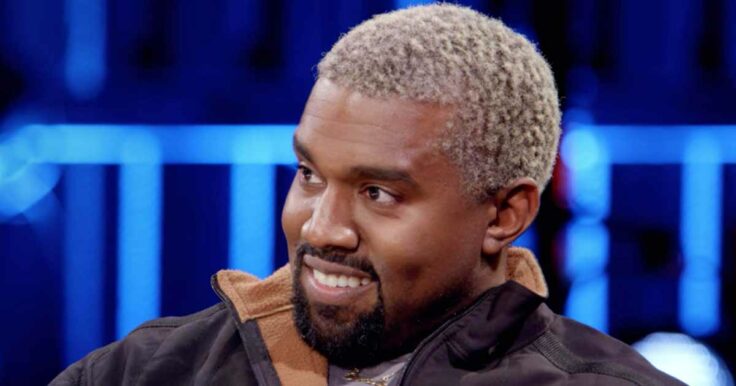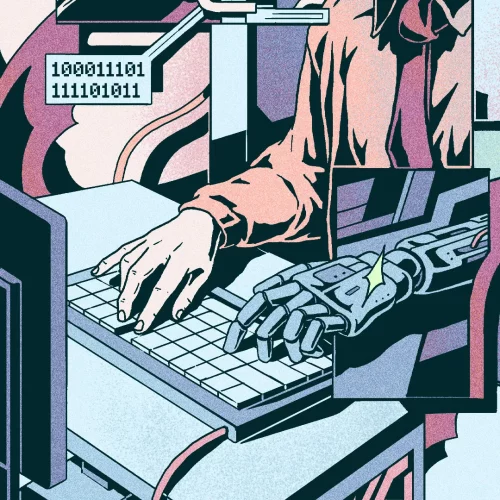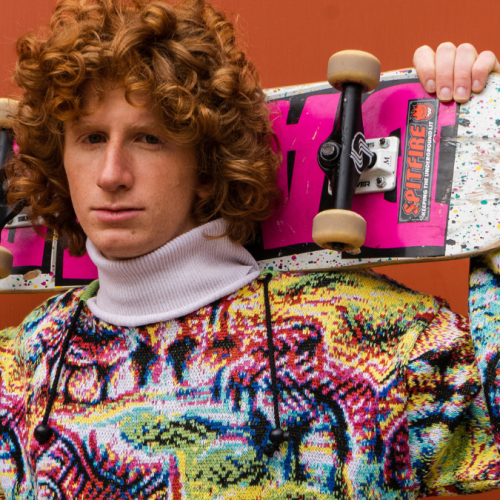Ever wished that you could rap like some of hip-hop’s greatest? Well now you can— unless it’s the actual bars that you’re struggling with, then there’s not much we can do to help other than suggest jumping on ChatGPT. But, if you’re looking to mimic the sound of some of your GOATs, then artificial intelligence (AI) may be the solution.
Over the weekend, tech specialist Roberto Nickson managed to have the whole of the music industry, and the internet in general, shook after recording a verse and replacing his voice using a trained AI model of Kanye West. In a video posted online, Nickson explained how an AI-generated server can make you sound almost note for note like the controversial Chicago rapper, even down to his signature vocal cracks.
In the clip, the tech entrepreneur plucked a random Yeezy-type beat off the internet, laid a handful of bars of his own down, recorded himself spitting them, then let the AI perform its magic— and the results are honestly unbelievable. Pretty indiscernible to the ears of the everyday Spotify listener, the final end-product sounded like it could have been a track produced right out of Ye’s studio.
And just like that. The music industry is forever changed.
I recorded a verse, and had a trained AI model of Kanye replace my vocals.
The results will blow your mind. Utterly incredible. pic.twitter.com/wY1pn9RGWx
— Roberto Nickson (@rpnickson) March 26, 2023
“All you have to do is record reference vocals and replace them with a trained model of any musician you like,” Nickson explained in the video. “I found this Kanye-style beat on YouTube, I wrote eight bars, I’m gonna record them now and then I’m gonna have AI Kanye replace me,” he added, predicting an increase in popularity and demand for these kinds of systems — especially for musicians.
Far from being without any consequences, in the tech savant’s own words, these new kinds of technology may “disrupt the music industry completely” giving whole new meaning and depth to what intellectual property is, can, or should be.
Indeed, what makes humans unique is their ability to be distinct from one another. French sociologist Pierre Bourdieu attempted to explain this individuality by coining the idea of primary socialization, which is the process by which a child acquires the attitudes, values, and actions that are considered suitable for individuals as members of a specific culture or society.
In layman terms, this means that the person we become, alongside the characteristics we possess, are inherently moulded by the people who raised us since we are primarily exposed to our families during our formative years. Conversely, secondary socialization refers to the acquisition of behavior in later stages of life that are built with personal affinities and choices in friendships that are outside of our initial inner circle (read: parents, extended family, and so on.)
As you can imagine, given the endless influences and exposures we encounter, not one person can even remotely be the same as another. With this information, one might believe that we’re simple products of our surroundings — despite that being one of our wealthiest of treasures. However, we must also recognize the importance of non-tangible factors such as talent and emotion, which contribute to the characteristics that make us so unique. The point is, while our environment and experiences can certainly shape us, they do not entirely define us. Rather, it is our inherent qualities — our talents, emotions, and other innate characteristics — that truly make us unique. But, the rapid rise of AI, especially ones designed to mimic our most intricate features, has caused many to fear that our human senses are doomed to be robbed away from us.
As social media platforms and digital technology continue to shape the entertainment industry, as we have seen happen with TikTok, the new developments in AI technology, especially when it comes to voice-mimicking, is taking things further. This has raised concerns about the limitations of AI compared to a human artist, and whether art may lose some of its unique beauty as a result.
Copyrights, intellectual property, and ethics make up some of the arguments that worry sceptics. For example, if a track is created using someone else’s voice, who does it belong to? What happens if an artist passes away? Is it ethical to continue using their voice in new music? This emerging field is inherently complex and far-reaching, and while there is currently little to no legislation surrounding it, time will ultimately tell which direction the music industry, and the world of entertainment as a whole, will take. As it stands, there are many challenges and concerns to navigate. Nonetheless, it is clear that this technology will continue to shape the future of music, and we can only speculate about what changes it will bring.







